- Home
- Kristin Cashore
Winterkeep Page 2
Winterkeep Read online
Page 2
“Did my father remember to give you that message?” Ranie said to Giddon, speaking so quietly that he had to move closer to her, lean in.
“What message?” he said, liking, despite himself, the way voices rumbled through these tunnels, turning into whispers, like the trickling water.
“Papa?” said Ranie, turning back to speak to the balding man who plodded along resolutely behind them, a sleeping baby strapped to his front. Beside him, his wife marched with an expression on her face like she would walk forever, if that’s what it took. It was an exhausted but determined sort of expression that Giddon recognized. He suspected she was walking on blistered feet. Parents did heroic things for their children.
“Papa, didn’t you have a message for Giddon?” said Ranie.
“Oh, yes,” said the man, blinking as if waking, then seeming startled by the volume of his own voice. The tunnels could do that, lull you into a sense of being inside yourself. Conversation could seem like violence.
“It’s a message about those two Monseans whose ship went down in Winterkeep,” said the man. “You know about that ship, the Seashell?”
Giddon suddenly saw Queen Bitterblue at the door to his rooms, clutching a letter, her tear-strewn face upturned to him. Bitterblue’s envoy to Winterkeep, Mikka, and one of her advisers, Brek, had died in that shipwreck on the other side of the world. And it had been an accident—Giddon had assured her over and over, hugging her in his doorway—but still, she’d blamed herself, for she’d been the one who’d sent those men away, to a death so far from home.
“Yes,” Giddon said grimly. “I know about the drowned Monseans.”
“I’m supposed to tell you that they had some news about something called zilfium.”
“News about zilfium?” said Giddon, who found this message rather opaque. Zilfium, to the best of his memory, was a kind of fuel that was important in Winterkeep, but he couldn’t remember why. “What news?”
“I don’t know,” said the man. “I only know that they wanted to tell Queen Bitterblue some news about zilfium, but then they went sailing that day and drowned. So the queen should learn what she can about zilfium.”
“Who told you to tell me this?” said Giddon.
“The man who brought us to the start of the tunnels, where you met us,” he said. “Bann, the one who’s the consort of Prince Raffin of the Middluns. He said he had it from Prince Raffin, who had it from a letter one of the Monseans wrote to him before he drowned.”
Council messages were often passed like this—from mouth to mouth. “Did Bann give you anything for me in writing?”
“No, nothing,” said the man. “Only what I’ve said: that before that ship went down, the Monseans had wanted to tell Queen Bitterblue some news about zilfium, so maybe Queen Bitterblue should look into zilfium.”
This message was intensely annoying, and Giddon didn’t think it was merely because he was wet and exhausted and carrying a child made of lead. One, he didn’t understand it. Two, he suspected some part of it was missing. And three, the reminder of her dead men was probably going to make Bitterblue cry.
Ranie was walking close to him again, and speaking so quietly that he had to bend down to her. He began to wonder if she might be doing this on purpose.
“What’s zilfium, Giddon?” she asked.
A stream of icy water hit the back of his neck. “I’m not sure,” he said crossly.
“She is doing it on purpose,” said Selie sleepily in his ear, making him jump. He’d been sure the child was asleep.
“Doing what?” he said, somehow finding this to be the most aggravating thing yet. Mind readers!
“Ranie’s talking in a low voice so you’ll get close to her,” Selie whispered, too quietly for anyone else to hear. “Also, I know your girlfriend is imaginary.”
“Oh? And do you know you’re as heavy as a horse?”
Selie was giggling. “Don’t worry,” she whispered. “I won’t tell.”
* * *
—
When, hours later, the party emerged from the tunnels into the pink morning light of the Monsean forest, tears began to stream down the face of Selie’s mother. She crouched onto a carpet of rotting leaves, sat, and said, “I just need to rest my feet for a moment, children.”
“Let me take a look,” said Giddon, lowering Selie stiffly to the ground. Selie made a protesting noise, clinging to him. “I need you to walk now, Selie,” he said. “You see the forest? This is Monsea. What do you think?”
The forest here was practically identical to the forest in Estill where they’d entered the tunnels: tall, thick trees with the pale green buds of early summer, dark, scraggy pines. Wind, birdsong, trickling water, squirrels.
But Selie began to cry. “It’s ugly,” she said, and Giddon understood. It was the nature of escape. A person consumed with the need to flee didn’t have the luxury of realizing how far away her home would seem, once she stopped running.
“Come, Selie,” said her mother, holding an arm out to the child. “Come keep me company while Giddon prods at my feet.”
“Your faith in my abilities is touching,” said Giddon. “Let me just go collect some sharp sticks to stab them with.”
Selie, still crying but now also giggling, tucked herself against her mother’s side, where she sniffled, receiving kisses, while Giddon took off her mother’s shoes. When he found her feet so bloody that it would be difficult to remove her socks without pulling her skin away, he chided himself for not checking sooner. Then he considered the distance still to go. The contact Giddon was bringing them to would have clean, fresh water, medicines, a bed for this woman to lie down upon. It wasn’t far, and the others seemed able to walk.
The baby was fussing. The woman reached her free arm out for the infant, then gave him her breast. The father and Ranie hovered nearby, as if wanting to be useful.
It would be best to wait to remove these socks. Thank goodness I’m big, Giddon thought.
When the baby was done feeding, the woman handed him back to her husband. Then Giddon gave her a pill for pain, lifted her into his arms, and carried her the rest of the way.
Chapter Two
It was late morning when Giddon, finally alone, caught sight of the bridges that crossed the river to Bitterblue City. It meant he was almost to his bed. He was riding a horse the Council contact had lent him and his thoughts were sluggish; he was trying to push thinking aside for now, with plans to welcome it back after he’d slept. But he couldn’t stop all thoughts, like, for example, the realization of how nice it was to be carried by this wonderful horse after hours of carrying others. Nor could he avoid thoughts of Bitterblue as he directed the horse onto the white-and-blue marble road of Winged Bridge.
Bitterblue had lost one of her advisers on this bridge. She’d tried to stop him, all by herself in a snowstorm, but her adviser had thrown himself over the edge. She’d been only eighteen. That suicide had been one of the legacies of the reign of Bitterblue’s father, King Leck, who’d been a terror, a psychopath. Five years later, things were better for Bitterblue, but she still carried the weight of all the damage her father had done to Monsea. There’d been no one to carry Bitterblue through it all. She’d carried herself, and now she carried her kingdom.
Giddon was also thinking about Winterkeep, a Torlan nation halfway across the world. It had only been a few spare years since the currents of the Winter Sea had thrown a Torlan fishing vessel onto Pikkian shores, and everyone’s understanding of the world had grown.
Giddon’s continent was composed of nine countries—the Seven Nations, the Dells, and Pikkia. Torla was apparently composed of five: Winterkeep, Kamassar, Borza, Tevare, and Mantiper. Winterkeep was the closest Torlan nation to Monsea. This made Winterkeep the natural first destination for Bitterblue’s envoys, traders, and spies. The Seven Nations had Gracelings. The Dells and Pikkia had monsters, vibrantly co
lored and mesmerizing, who could numb your mind to their attack. But according to the reports, Winterkeep was a land of miracles. Keepish people spoke to telepathic sea creatures and kept telepathic foxes as pets. They flew across the sky in ships attached to balloons. Their government was a democratic republic composed of people who liked one another. They had an academy for young people, run by the same scholars who ran the government, and renowned all across Torla. They had advanced medicines and powerful fuels. They wanted to meet Monsea’s queen. Would she come?
For three or so years, Bitterblue had been receiving such letters. She and her friends had begun to learn the Keepish language—for a while, it had been a bit of a fad—and import Keepish goods. The silks of Winterkeep were bright and beautifully woven and their oils produced a clear, warm light. Winterkeep also had a vast range of teas that were medicinal or recreational, some merely delicious. The Torlan nations were close enough for trade, but seemed to have no thoughts of war. The Keepish were dark-haired like the Lienid, dark-eyed as well, with browner skin than anyone from Giddon’s continent. The Torlan continent had at least five languages and the Keepish were eager to communicate with their new neighbors across the sea. In Monsea, as in all Seven Nations, the native language was called Lingian, shortened from “Gracelingian.” At the request of the Keepish prime minister, Bitterblue had sent teachers to the Winterkeep Academy, to teach Lingian to the Keepish.
Everything had been exciting and hopeful. Until her envoy and one of her advisers had taken a pleasure cruise in the Brumal Sea and gone down with their ship. Before getting a chance to tell Bitterblue news about zilfium, apparently.
When Giddon reached Bitterblue’s court, he slid off his horse. A groom materialized, taking the responsibility of the animal away from him with such efficiency that he could have wept with relief. He dragged himself through the castle, down corridors, up staircases, talking to no one, looking at no one. He found his rooms, blundered inside, ignored the mountain of letters on the table, the cat on the armchair who shot him an aggrieved look. He was asleep before he’d even landed on the bed.
* * *
—
In early evening he woke, feeling like a new man. He glanced around for the cat. Lovejoy, the world’s oldest, scruffiest, and grouchiest animal, belonged to the royal librarian and always entered and exited Giddon’s rooms by his bathing room window. The window was five floors above the ground and the cat did a terrifying shimmying maneuver down the slope of a nearby roof in order to avail himself of it. The first time Giddon had seen the stupid cat half sliding, half barreling down the roof with legs akimbo like he was having a skiing accident, Giddon had yelled at him, then gone downstairs and yelled at the librarian, then determined to keep his window closed. But then Lovejoy had just come clunking against the closed window, the fur of his face and body pressed flat as he glared in at Giddon, outraged. Giddon, who’d been in the bath, had surrendered. He kept the window open now, and tried not to jump out of his shoes whenever the cat came flying in like a piece of mail through a mail chute.
Lovejoy was lying in the middle of the pile of letters on the table, blinking at Giddon.
“Did you miss me?” said Giddon.
Lovejoy stuck one foot in the air and bit his own bottom.
“I missed you too,” Giddon said. Then he pushed himself up and went to the bath.
* * *
—
Sometime later, his skin scrubbed white again, his dark hair combed, and his beard trimmed close, Giddon went searching for the queen.
He found her in her lower offices, standing beside her adviser Froggatt’s desk, looking over his shoulder, studying some papers with him. Small, gray-eyed, serious, her hair in its usual dark braids. Something inside Giddon relaxed and something else tightened.
She glanced up and her whole being brightened. “You’re back,” she said. “How was your trip?”
“It went well,” he said, then noticed a man at the far end of the room who was talking to two royal advisers. He was whip-thin, his light hair graying at the temples, his smile a humorless flash of teeth. His name was Lord Joff; he was from Estill’s south, near the tunnels; and he was one of the minor Estillan nobles who’d secretly sought the Council’s help deposing their king. And now he was one of many investing his personal fortune in the growth of Estill’s army, which kept expanding and strengthening. Recently Giddon had begun to wonder if liberating Estill from its king had been the Council’s first truly grave mistake. What if Estill retaliated against Bitterblue and Monsea for aiding the escape of its Gracelings?
Why was he here?
“That’s good,” said Bitterblue, who’d noticed Giddon’s fixation on Joff but wasn’t drawing attention to it. Then Joff glanced up. At the sight of Giddon, Joff’s eyes narrowed, pale blue chips of ice. Giddon stared back at him implacably.
“Giddon?” said Bitterblue.
“Do you have a minute?” he asked her.
The queen nodded at Froggatt, who was eyeing Giddon with displeasure. The advisers might not know all Giddon got up to, and they certainly didn’t know he was sneaking Estillan Gracelings across their borders, but they knew enough of the rumors about the Council to consider him an inappropriate friend for the queen. “Excuse us, Froggatt,” she said. “Giddon, come upstairs.”
She led the way up the spiral staircase to the castle’s highest tower, where she kept her private office. The light was always brilliant in this room, with windows facing every direction. Tonight, the western sky was painted with streaks of violet and orange.
“How are you really, Giddon?” said Bitterblue. “How were the tunnels? You look tired.”
“I’m fine, really, but why is that Estillan in your office?”
“I saw you trying to kill him with the power of your eyes,” said Bitterblue. “My advisers are harboring a delusion he’ll turn my head.”
“What?” said Giddon, honestly a little shocked. “They want you to marry a known Estillan revolutionary?”
“They want me to marry an Estillan noble with influence in the new Estillan government, which would make Estill our military ally.”
“Does he want to marry you?”
“He claims it’s why he’s visiting.”
“But why would he want to marry you?”
Bitterblue giggled. “Don’t worry, I’m not insulted.”
Giddon was grinning. “You know what I mean.”
“Yes. I’m sure he intends some advantage to himself or Estill, but I don’t know which advantage, and unfortunately, I’ll never know, because I’m not going to encourage him. Is Joff what you wanted to talk about? I got the impression it was something about your trip.”
“Oh, yes,” he said. “What’s zilfium, exactly?”
“Zilfium?” she repeated, rubbing her braids the way she did when her neck was hurting. “It’s a rock that’s a powerful Torlan fuel. It’s used all over the Torlan continent, except in Winterkeep, where it’s illegal.”
“Why is it illegal in Winterkeep?”
“I believe it’s because zilfium use pollutes the air,” said Bitterblue, going to the large desk that sat in the middle of the room. She began to shuffle through papers, the gold rings on her fingers catching the light. “Maybe the water too. Winterkeep mines zilfium and exports it, but they don’t use it there. I have more information here somewhere. We can call for Froggatt—”
“Before you do,” said Giddon, “we have a message from Raffin. He says one of your men who died in Winterkeep wrote him a letter. Whichever man it was—”
“That would be Mikka, my envoy,” said Bitterblue, her voice suddenly quieter. “He had a correspondence going on with Raffin and Bann about medicines. He was an outdoorsman. He used to go hiking for days, then send them packages full of seeds and leaves.”
“Ah,” said Giddon. “Well, Mikka wrote to Raffin that he had news to tell you a
bout zilfium. Did you get any news about zilfium?”
“None. What kind of news?”
“I have no idea. But Raffin says you should look into zilfium.”
“Look into it?” said Bitterblue, who was still shuffling through papers. “Look into it how?”
“Again, I have no idea.”
“What a silly message. Why can’t I find anything on this desk? Oh, weaselbugger!” said Bitterblue, then strode to the stairway and bawled “Froggatt!” down the steps.
A moment later, Froggatt appeared in the doorway. “Yes, Lady Queen?” he said, peering at her over his droopy whiskers.
“Where’s my information about zilfium?”
Froggatt turned and ran downstairs again.
“Katu is always talking about zilfium,” Bitterblue muttered, starting on a different pile. “Not that he’s bothered to write to me in forever.”
Giddon made his face even and friendly. Katu Cavenda was a Keepish man, wealthy, an adventurer, who’d come to Monsea sometime back and become Bitterblue’s instant boyfriend. He was irritatingly young and likable, irritatingly handsome with his Keepish looks, his soft Keepish accent, and the streak of white in his black hair that pulled everyone’s eyes to him. He was also a perfectly nice person. Giddon’s friend, really; he’d taught Giddon to sail a boat, right here in the river.
“What does he say about it?” said Giddon pleasantly.
“That everybody fights about zilfium in the Keepish Parliament,” said Bitterblue, then tilted her head as if remembering. “A lot of people in Winterkeep want to legalize zilfium use.”
Froggatt bolted into the room again, huffing and pink, bearing a sheaf of papers, which he placed into Bitterblue’s hands.

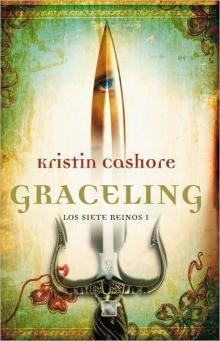 Graceling
Graceling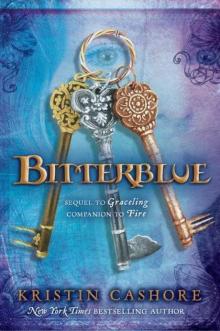 Bitterblue
Bitterblue Fire
Fire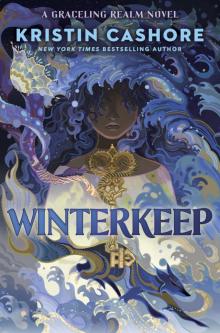 Winterkeep
Winterkeep Helen Keller in Love
Helen Keller in Love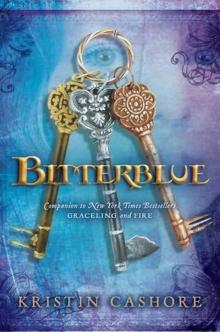 Bitterblue skt-3
Bitterblue skt-3 Fire skt-2
Fire skt-2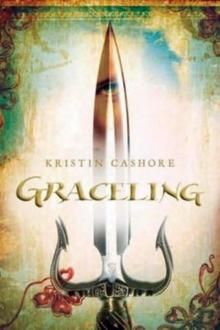 Graceling skt-1
Graceling skt-1